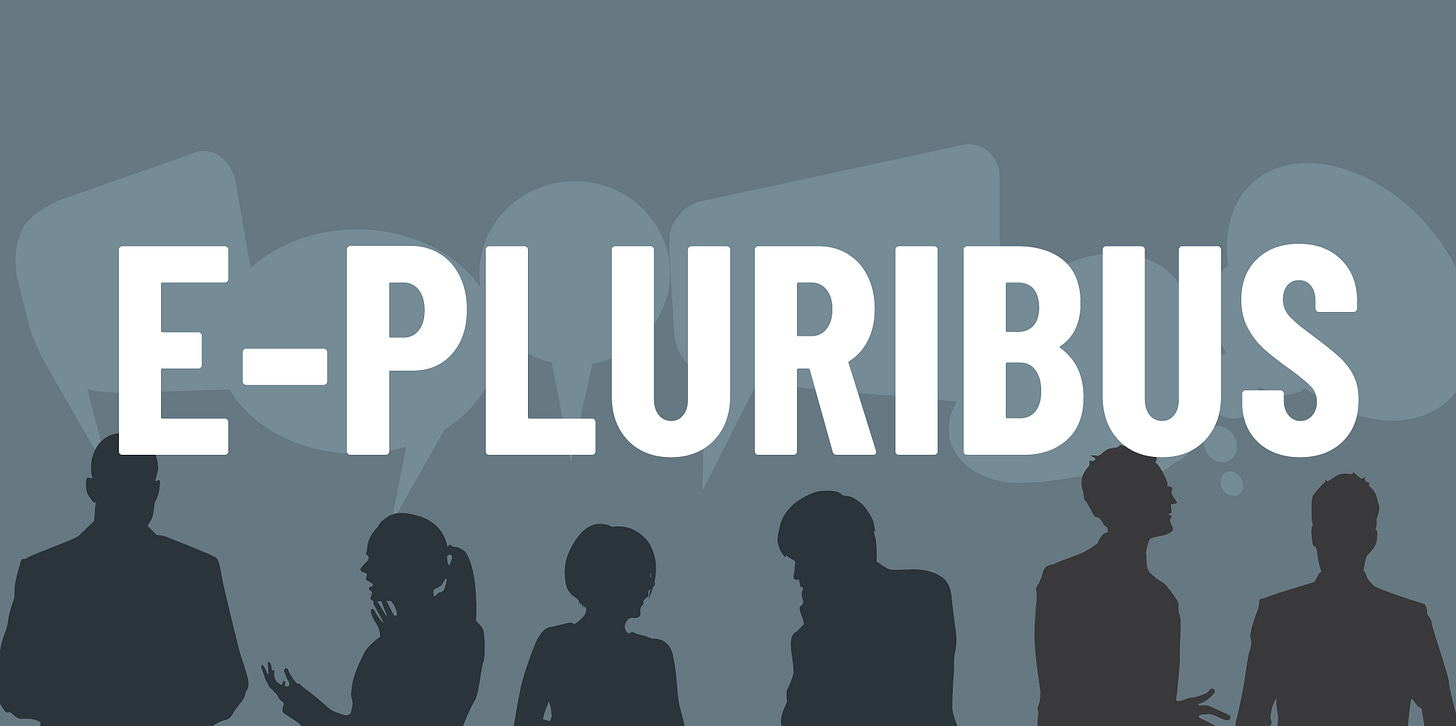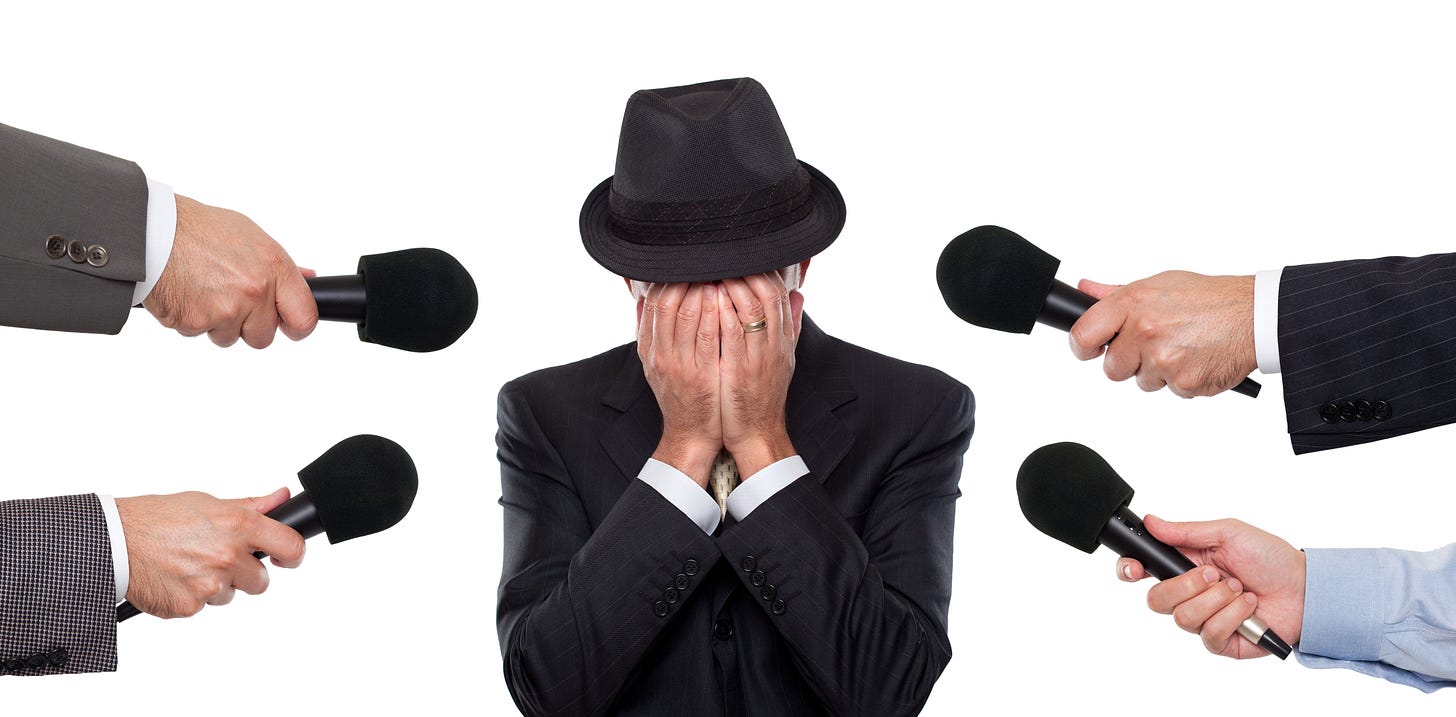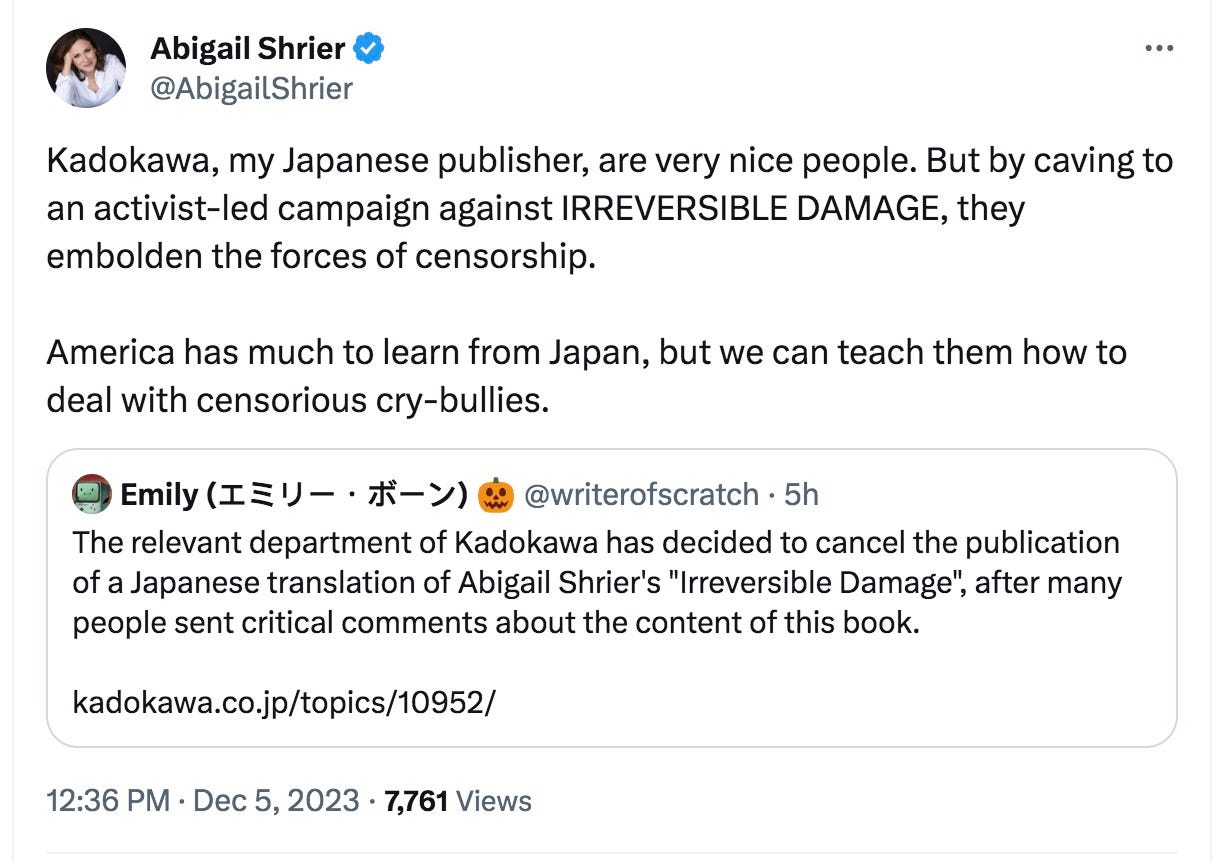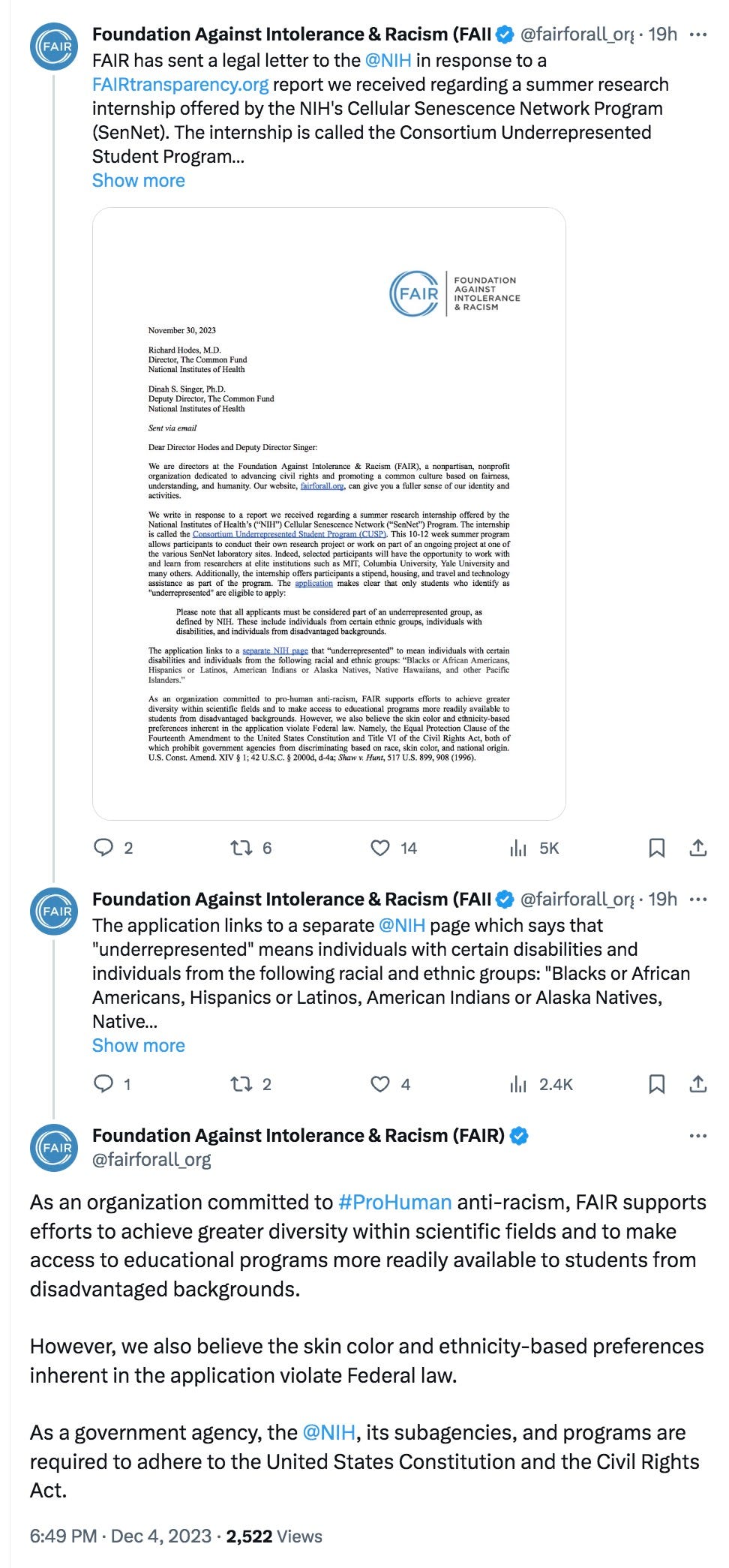E-Pluribus | December 5, 2023
Degrees of victimhood; when shaming goes too far; and securing the freedom to donate.
A round-up of the latest and best musings on the rise of illiberalism in the public discourse:
Richard B. Felson: Victim Blaming Revisited
The fact that the URL for an article titled “Victim Blaming Revisited” contains the words “a-modest-defense-of-victim-blaming” illustrates just how sensitive the topic is. Any suggestion that a crime victim deserved his or her treatment is generally met with revulsion, but Richard Felson at Quillette goes deeper into the factors that determine our response to crime and what it says about our principles.
There are biases in victim blaming, but they can apply to any type of crime. These biases can lead us to assign too much blame to victims or too little. In other words, sometimes we are too critical of victims and sometimes not critical enough.
Hindsight can lead us to assign blame to victims when it is not deserved. The critic knows the outcome but fails to consider that victims made their decisions without that knowledge. In other words, the critic believes that the outcome was foreseeable when it was not. As a result of the hindsight bias, we tend to judge behavior more harshly when it has a negative consequence. For example, we found that students were more likely to criticize Rachel when her behavior was followed by a rape or a robbery than when nothing bad happened to her afterwards. Her behavior was the same in all instances so the level of blame should have been the same. She was assigned more blame than she deserved because of the hindsight bias.
Sometimes we are less critical of victims than we should be because we sympathize with them and desire to support them. We think they have behaved irresponsibly but sympathy leads us to avoid criticizing them, at least to their faces. I did not communicate my criticism to my son when he was mugged, although he will discover it when he reads this piece. Sympathy may explain why many students avoided using the word “blame” when they criticized Rachel. While only 35 percent thought that Rachel deserved at least some blame for the rape in her apartment, 73 percent thought that Rachel’s behavior was at least somewhat irresponsible or that she should not have put herself in that situation. They were more than twice as likely to engage in indirect criticism. It would be unkind to say the victim was blameworthy, so they avoided using the word “blame.”
We are not always so sympathetic towards victims. When we are morally offended by the victim’s behavior, we are more likely to criticize it. We found that students opposed to casual sex were more likely to blame the victim in our vignettes than students who were favorable to casual sex. For example, they were more likely to blame Rachel if she drank so much that she passed out at a fraternity party. They were critical of her even in scenarios where her behavior did not have a bad outcome. Clearly, some students are offended by the campus culture of drinking and casual sex and judge participants more harshly.
Read it all.
Amanda Knox on the Harms of Public Shaming
Whether she deserves it or not, Amanda Knox knows what it’s like to be reviled. Although acquitted of a murder charge in 2015, Knox says her reputation will always be stained in the eyes of many. At Persuasion, Knox uses her own experience and interviews with others who have been “cancelled” to examine what happens to defendants convicted in the court of public opinion with no hope of appeal—and what it says about the rest of us.
Students are ripping down posters of kidnapped Israeli children. Others have signed pro-Hamas statements. These students are facing recriminations: some are being filmed, while others have had their names collected and publicly displayed in the hopes that they might never be employed again.
[. . .]
What is the appropriate consequence for a deplorable act? Do we actually turn down the heat on this ideological conflict through such aggressive publicity, or do we merely contribute to the strife? Surely something must be done about these students chanting, “from the river to the sea,” but is the “doxxing truck” really the solution?
My answer to these questions is simple. I see a lot of people around me losing friends over the ideological conflict surrounding Israel and Palestine. How could I see this person in the same way again knowing they support (fill in the blank)? It’s a legitimate question, and if your only tools are judgment and condemnation, it seems like there’s only one answer. But we have other options beyond judgment.
What the students who are caught up in the conflict are doing may or may not haunt them in the future. It’s our job to decide whether we give them room and time to mature, or condemn them for their actions in perpetuity. If you’re someone who detests the poster ripping, it’s easy to slip into statements like, “If you are tearing down posters showing kidnapped children, you are one of the bad guys.” But the precision of our language matters, and there is an important difference between condemning an act and condemning the person who commits it. When we think in terms of “bad guys” and “good guys,” we only reinforce our tribal divisions.
As much as I personally find the ripping down of posters of kidnapped children morally revolting, I know that people grow and change, and I’m hesitant to write off a person who does such a thing as a “bad guy,” just as I am hesitant to write off people who commit crimes, even violent crimes like assault, as criminals incapable of moral growth. As Bryan Stevenson so eloquently put it in reference to his work defending men on death row: “Each of us is more than the worst thing we’ve ever done.”
I don’t think the solution is to let offensive acts go unnoticed or unrecorded. If you’re willing to take a public action, like putting up a poster or ripping one down, you should put your name behind it. Documenting such acts is an important way to take the pulse of the current moment.
But neither do I think that the solution is the “doxxing truck.” We need to be more reserved in our judgments of what we see, more aware that all humans are complex and not reducible to the five-second clip that pops up in our daily doomscrolling. We should also be on guard against schadenfreude. We should resist the impulse to delight in righteous comeuppance. Sometimes the pile-on targets a person who is completely innocent. Other times, the magnitude of the public shaming and cancellation far outweighs the offense. In this way, wanting to cancel the poster rippers or statement signers, to make them forever unemployable, is the same mistake as the poster ripping itself: the discouragement and silencing of dialogue instead of the embrace of it.
Read the whole thing.
Institute for Free Speech: Court: IRS Donor Disclosure Law Must Overcome Exacting Scrutiny
If you think disclosure laws are an irredeemably dull subject, this Institute for Free Speech blog post should disabuse you of that notion. Like it or not, political donations are considered political speech in the US; the court challenge discussed here could help maintain the freedom of Americans to support whatever causes they like without undue government interference.
A recent, positive development in The Buckeye Institute v. Internal Revenue Service (“Buckeye”) provides another important indicator that defenders of civil liberties have a potent new precedent with which to challenge unconstitutional disclosure laws.
[. . .]
The U.S. Supreme Court has already struck down a similar disclosure mandate in the landmark 2021 case Americans for Prosperity Foundation v. Bonta (“AFPF”). There, the Court held that a California regulation requiring non-profit organizations disclose the names of their significant donors to the State was not narrowly tailored to the government’s interest. “When it comes to a person’s beliefs and associations,” the Court explained, “broad and sweeping state inquiries into these protected areas discourage citizens from exercising rights protected by the Constitution.” 141 S. Ct. 2373, 2384 (2021) (cleaned up).
[. . .]
In Buckeye, the government argued that AFPF doesn’t apply because the disclosure rule in question is a condition on a tax subsidy (i.e. the Buckeye’s tax-exempt status), rather than a compelled disclosure. The argument goes something like this: Because Buckeye voluntarily accepts tax-exempt status, it could avoid disclosing its donors by declining the tax exemption. Thus, its mandatory disclosure law does not mandate disclosure at all, and so AFPF’s requirement that disclosure laws be narrowly tailored does not apply. As further explained in this pre-AFPF blog post, such a trade would “remov[e] an important free speech limit on government power” and cause “a massive problem” for First Amendment rights. That’s because “almost all Americans take tax deductions, receive governmental benefits, or participate in governmental programs.”
[O]n November 9th, Judge Michael H. Watson of the U.S. District Court for the Southern District of Ohio rejected the government’s argument and ruled that exacting scrutiny is the appropriate level of review to apply to the law in question in the Buckeye case. Relying on AFPF, Judge Watson’s order shifts the burden to the IRS. The government must prove that this law is narrowly tailored to achieve the government’s interest in tax enforcement and administration. That means the government must justify collecting sensitive donor information from every 501(c)(3) non-profit every year, rather than adopting a rule requiring disclosures only under very particular circumstances. And under AFPF, the government can’t rely on weak rationales such as administrative convenience or efficiency to defend its universal, up-front collection.
Read it all here.
Around Twitter (X)
Abigail Shrier is running into trouble again with her book on the runaway transgender fad among young girls, Irreversible Damage, this time in Japan:
The Foundation Against Intolerance & Racism (FAIR) calls out the National Institutes of Health for its internship offer open only to “underrepresented” individuals, a euphemism for discrimination:
Finally, many critics consider the U.S. Department of Education to be little more than a bloated, ineffectual bureaucracy. As if trying to prove its opposition correct, the agency is now promoting learning through… unicorns. (Click for video.) Hat tip, Robert Pondiscio and Wesley Yang









